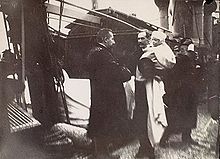Christian Michelsen

Peter Christian Hersleb Kjerschow Michelsen (15 March 1857 – 29 June 1925) was a Norwegian shipping magnate and statesman. He was Prime Minister of Norway from 1905 to 1907. Michelsen is most known for his central role in the dissolution of the union between Norway and Sweden in 1905, and was one of Norway's most influential politicians of his time.
Early life
Born in Bergen, he was named after his grandfather, bishop Peder Christian Hersleb Kjerschow.[1]
Career
Christian Michelsen was a lawyer and ship-owner. He became a member of the Norwegian Parliament in 1891, representing the Liberal Party. He considered himself mostly above petty party strifes, and one of his major aims was to create a coalition of parties reaching from the Conservative Party to the Liberal Party, which he called the Coalition Party. He became a member of the second cabinet Hagerup, and was one of the strongest proponents of a more firm policy towards the union between Sweden and Norway. In March 1905, Michelsen replaced Francis Hagerup as Prime Minister, and immediately became the leader of the movement towards dissolution of the union.
The formal basis for the dissolution was King Oscar II's refusal to accept the Norwegian consular laws. The Swedish government had for several years insisted that laws governing foreign affairs had to be a part of the union agreement, and as such, consular laws could not be passed by the Norwegian Storting without consent of the Swedish Riksdag (parliament). The Swedes were willing to accept the Norwegian urge for separate consular affairs, but they demanded that Norway accept the precedent under which the union had operated for 90 years, namely that the Foreign Minister be Swedish. This, the Norwegians felt, acknowledged Sweden as having the upper hand in the Union. While this supremacy existed in reality, Norwegians were unwilling to accept the unequal relationship on a formal, legal basis.
On 27 May 1905 King Oscar refused to sign the bill, and in response the Norwegian cabinet ministers resigned collectively. The king took no further action, probably aware that a dissolution of the Union was imminent, and the Swedish politicians did nothing, probably believing that this was another Norwegian political retreat. On 7 June the Norwegian Storting declared that because the King had been unable to form a new government in Norway after Michelsen's resignation, he had lost the capacity to rule and hence ceased to be king of Norway. This strategic move gave the dissolution a somewhat legal basis, and was primarily the work of Christian Michelsen.
He knew that the Norwegian people, after months of well-directed information in a unanimous press, was united in a way that is extremely rare in a democracy. In the referendum that proved the Norwegian will to dissolve the union, retention of the union garnered a mere 184 votes nationwide, which represented only one vote out of every 2000 cast.
Michelsen, though a believer in a democratic republic in Norway, accepted that a democratic monarchy would have the greatest chances to be accepted abroad and among a majority of Norwegians. Prince Carl of Denmark became King Haakon VII of Norway after a new referendum had given the monarchy proponents approximately 79% of the votes cast.

In 1906 Michelsen won the election on an "above-the-parties" ticket, which quickly alienated the leading Liberals from him. In 1907 he resigned, having tired of petty squabbles among the political leaders, and accepting that his political views had been defeated. Jørgen Løvland carried on Michelsen's work, but lacked the will to force the coalition to stand united, and in 1908 the coalition broke down. Michelsen never reentered politics. Michelsen bequeathed a large part of his fortune to the establishment of a foundation for science and intellectual freedom, that later became the Chr. Michelsen Institute.
His distaste for party politics can be summed in the following quote: "The party congresses are the scene where a number of irresponsible politicians meet to make a tasty stew for the nourishment of their constituents."
Honors
In 1905 he was awarded the Grand Cross of The Royal Norwegian Order of St. Olav and in 1907 he received the Collar as well.
In recent times, the Chr. Michelsen Institute (CMI) was established as an independent centre for research on international development and policy. Founded in Bergen in 1930, CMI conducts both applied and theoretical research, and has a multidisciplinary profile anchored in four thematic research groups, namely Human Rights, Democracy and Development, Peace, Conflict and the State, Poverty Reduction and Public Sector Reform.
References
- ^ «Nu gjælder det at holde kjæft», by Øyvind Ask, Bergens Tidende.
This article needs additional citations for verification. (June 2009) |
